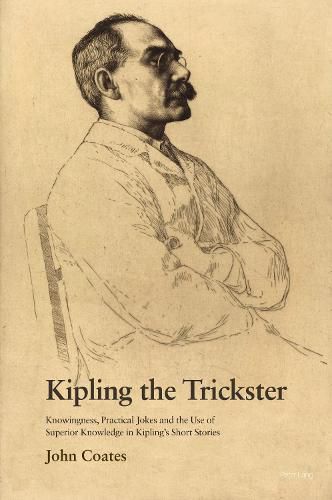Readings Newsletter
Become a Readings Member to make your shopping experience even easier.
Sign in or sign up for free!
You’re not far away from qualifying for FREE standard shipping within Australia
You’ve qualified for FREE standard shipping within Australia
The cart is loading…






This title is printed to order. This book may have been self-published. If so, we cannot guarantee the quality of the content. In the main most books will have gone through the editing process however some may not. We therefore suggest that you be aware of this before ordering this book. If in doubt check either the author or publisher’s details as we are unable to accept any returns unless they are faulty. Please contact us if you have any questions.
This book is an exploration of the way in which the characters in Rudyard Kipling’s short stories use superior knowledge, which often involves deception and the playing of practical jokes. There was early critical hostility to the stance adopted by Kipling’s characters, that of a superior knowledge acquired by friendship with a small male circle. This book engages with a long-standing critical tradition which treats the jokes as acts of vicarious revenge or symptoms of supposed defects in Kipling’s personality, instead setting his use of the practical joke in the wider social context of his time.
In this book Kipling’s writing is examined for what it reveals about a complex, self-conscious but powerful range of values rather than what it is supposed to disguise or conceal. Although he endorsed British colonial rule, Kipling was frank about the slackness, endemic rule-breaking and second-rate nature of British rule in India. He also criticised some of the widespread cultural, religious and moral phenomena of his time, which he thought harmful. Many of his short stories contain an implied but serious criticism of Victorian beliefs, from attitudes to death-beds, and schoolboys to Positivism.
$9.00 standard shipping within Australia
FREE standard shipping within Australia for orders over $100.00
Express & International shipping calculated at checkout
This title is printed to order. This book may have been self-published. If so, we cannot guarantee the quality of the content. In the main most books will have gone through the editing process however some may not. We therefore suggest that you be aware of this before ordering this book. If in doubt check either the author or publisher’s details as we are unable to accept any returns unless they are faulty. Please contact us if you have any questions.
This book is an exploration of the way in which the characters in Rudyard Kipling’s short stories use superior knowledge, which often involves deception and the playing of practical jokes. There was early critical hostility to the stance adopted by Kipling’s characters, that of a superior knowledge acquired by friendship with a small male circle. This book engages with a long-standing critical tradition which treats the jokes as acts of vicarious revenge or symptoms of supposed defects in Kipling’s personality, instead setting his use of the practical joke in the wider social context of his time.
In this book Kipling’s writing is examined for what it reveals about a complex, self-conscious but powerful range of values rather than what it is supposed to disguise or conceal. Although he endorsed British colonial rule, Kipling was frank about the slackness, endemic rule-breaking and second-rate nature of British rule in India. He also criticised some of the widespread cultural, religious and moral phenomena of his time, which he thought harmful. Many of his short stories contain an implied but serious criticism of Victorian beliefs, from attitudes to death-beds, and schoolboys to Positivism.